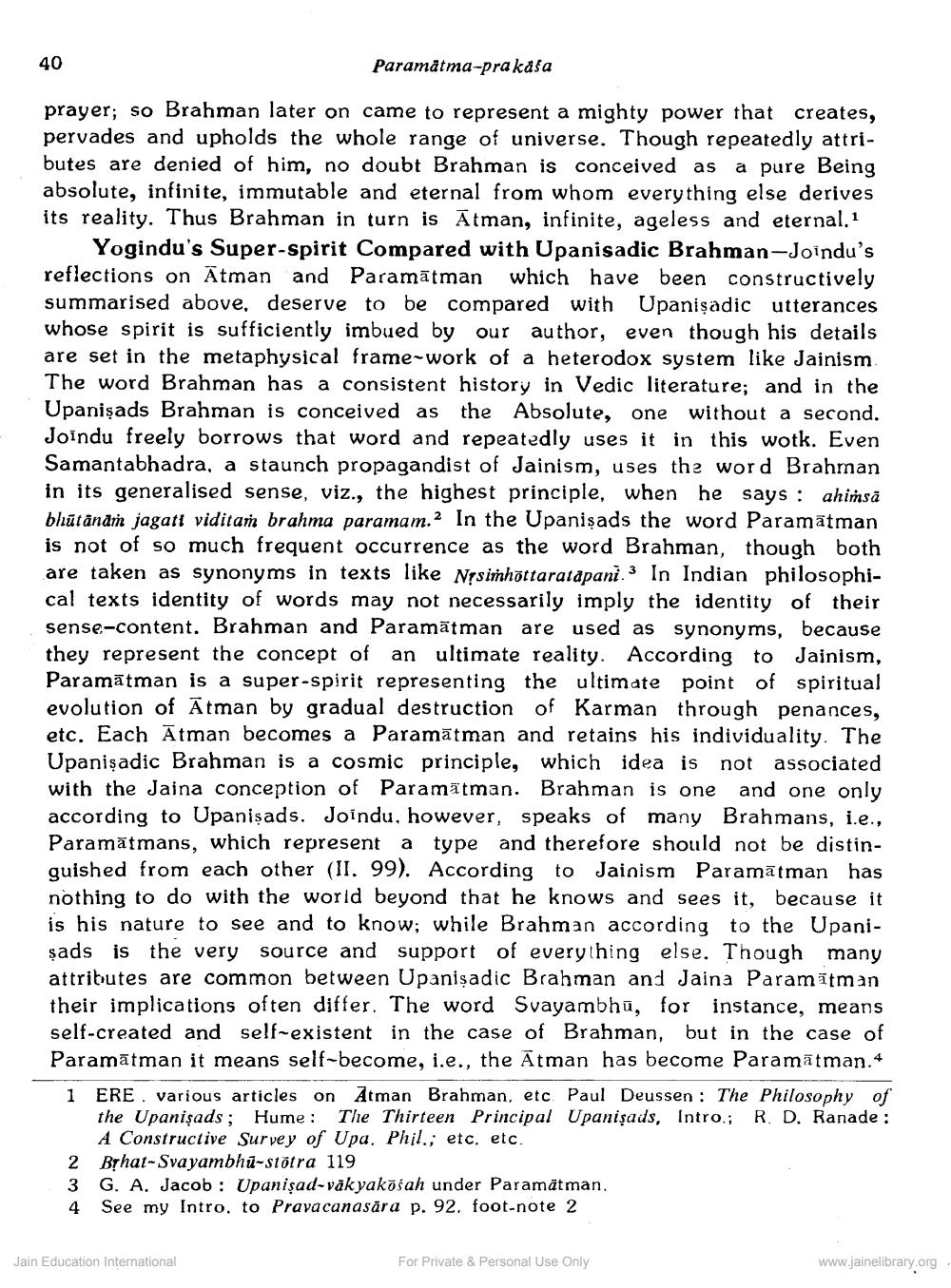________________
40
Paramåtma-prakasa
prayer; so Brahman later on came to represent a mighty power that creates, pervades and upholds the whole range of universe. Though repeatedly attributes are denied of him, no doubt Brahman is conceived as a pure Being absolute, infinite, immutable and eternal from whom everything else derives its reality. Thus Brahman in turn is Ātman, infinite, ageless and eternal.1
Yogindu's Super-spirit Compared with Upanisadic Brahman-Joindu's reflections on Ātman and Paramātman which have been constructively summarised above, deserve to be compared with Upanişadic utterances whose spirit is sufficiently imbued by our author, even though his details are set in the metaphysical frame-work of a heterodox system like Jainism The word Brahman has a consistent history in Vedic literature; and in the Upanişads Brahman is conceived as the Absolute, one without a second. Joindu freely borrows that word and repeatedly uses it in this wotk. Even Samantabhadra, a staunch propagandist of Jainism, uses the word Brahman in its generalised sense, viz., the highest principle, when he says : ahiṁsā bhūtānāṁ jagati viditam brahma paramam.2 In the Upanişads the word Paramātman is not of so much frequent occurrence as the word Brahman, though both are taken as synonyms in texts like Nộsimhöttaratapani. 3 In Indian philosophical texts identity of words may not necessarily imply the identity of their sense-content. Brahman and Paramātman are used as synonyms, because they represent the concept of an ultimate reality. According to Jainism, Paramātman is a super-spirit representing the ultimate point of spiritual evolution of Ātman by gradual destruction of Karman through penances, etc. Each Ātman becomes a Paramātman and retains his individuality. The Upanişadic Brahman is a cosmic principle, which idea is not associated with the Jaina conception of Paramātman. Brahman is one and one only according to Upanişads. Joindu, however, speaks of many Brahmans, i.e., Paramātmans, which represent a type and therefore should not be distinguished from each other (II. 99). According to Jainism Paramātman has nothing to do with the world beyond that he knows and sees it, because it is his nature to see and to know; while Brahman according to the Upanişads is the very source and support of everything else. Though many attributes are common between Upanisadic Brahman and Jaina Paramātman their implications often differ. The word Svayambhū, for instance, means self-created and self-existent in the case of Brahman, but in the case of Paramātman it means self-become, i.e., the Ātman has become Paramātman.4 1 ERE. various articles on Atman Brahman, etc. Paul Deussen : The Philosophy of
the Upanişads; Hume: The Thirteen Principal Upanişads, Intro; R. D. Ranade :
A Constructive Survey of Upa. Phil., etc. etc. 2 Bịhat-Svayambhū-stötra 119 3 G. A. Jacob : Upanişad-vākyakõsah under Paramātman. 4 See my Intro, to Pravacanasāra p. 92. foot-note 2
Jain Education International
For Private & Personal Use Only
www.jainelibrary.org




